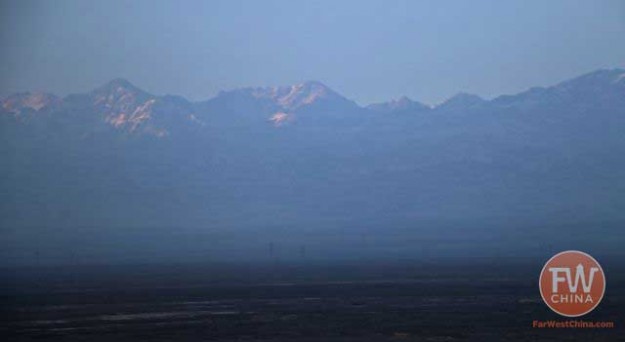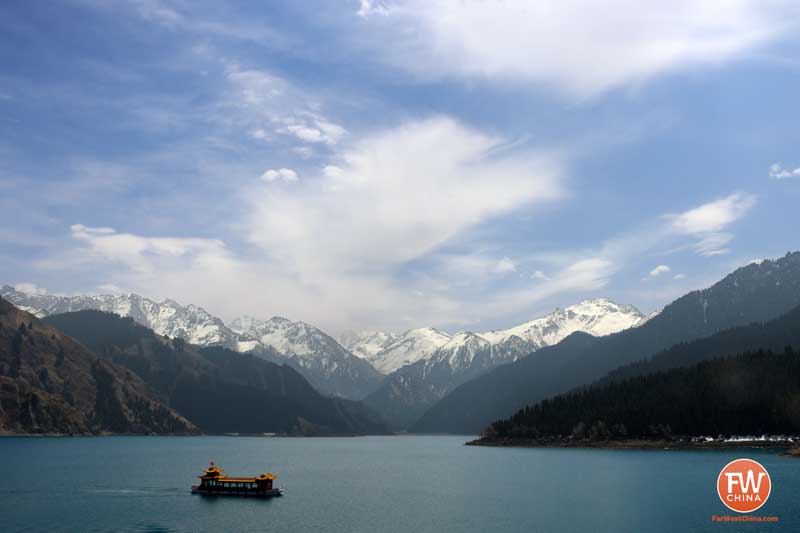Xinjiang’s High Speed Train | Traveler’s Guide
In December of 2014, Xinjiang’s first high speed train was opened to the public. At the time, it only reached as far as Hami, but in 2015 it connected the Xinjiang capital of Urumqi with the Gansu capital of Lanzhou. Here’s the story of this high speed train and my experience taking it.
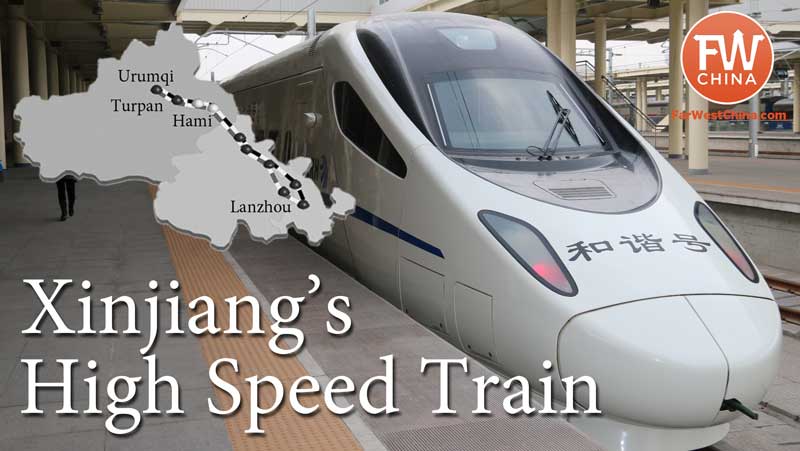
Sitting here in this comfortable high-speed train watching the Xinjiang countryside whiz by forces me to remember the first time I stepped foot in this incredible region.
I remember the majestic snow-capped TianShan presiding over the vast swaths of farmland.
I remember seeing herds of sheep and camels out the window.
I remember feeling like Xinjiang’s desert wasteland extended on forever.
I also remember being cramped in a small car that felt like it was going to fall apart at speeds exceeding 60km/hr. Today, I’m cruising in a beautiful new high-speed train that glides smoothly along Xinjiang’s desert at 200km/hr.
The views of Xinjiang are essentially the same, but the window through which I see them has changed.
Below I want to share with you a little background on this new train line as well as tips for travelers who want to give it a try themselves.
Xinjiang’s High Speed Train (Video)
To start, I’m going to share a video I filmed back in 2014 when the high speed train line first opened up.
At the time, the train line only went to Hami (which I mention in the video), but as you’ll learn in the rest of this article, it has since stretched all the way to Lanzhou.

Don’t miss any more Xinjiang videos! Subscribe to FarWestChina on Youtube!
New Era of High Speed Rail in Xinjiang
The train line now spans from Lanzhou to Urumqi…”
Back in January of 2010, when construction of the LanXin high speed rail line officially began, five years seemed like an eternity away.
Truthfully, I didn’t think I was going to be around here long enough to see it completed.
Back in 2009, I had met my family in Shanghai and subjected them to a grueling 46 hours in a train to Urumqi.
Although I don’t think any of us regret the trip, I doubt it’s one we would willingly take again. The idea that a high speed train could cut that time down to less than 20 hours seemed like a pipe dream at the time.
Progress marches on, though, and on October 16, 2014 Xinjiang officially entered the era of high-speed rail transport. I bought my first ticket to ride less than two weeks later.
Quick Look at the LanXin Line
This high speed train is part of what’s known in China as the “Lan-Xin” rail (兰新高铁), which is shorthand for saying “Lanzhou to Xinjiang” railway.
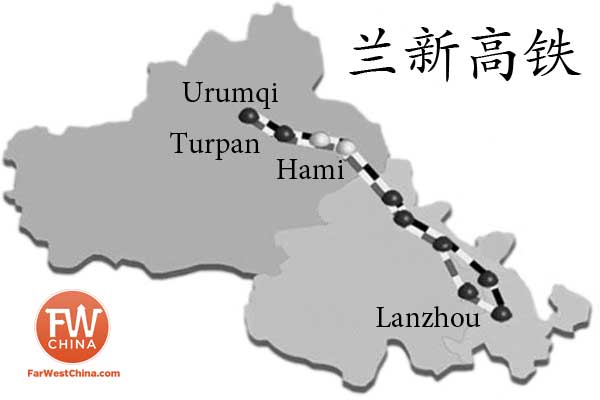
The line spans from southern Gansu province, through Qinghai and into Xinjiang. Between Lanzhou and Urumqi there are only 8 stops which include some great tourist spots like Dunhuang, Hami and Turpan.
Engineers had to overcome quite a few technical challenges during the construction of this rail line.
Most importantly, they had to figure out how to safely navigate a high speed train through famously windy sections of Xinjiang desert without toppling over, something which had tragically happened before.
Due to these concerns and others, large wind barriers and tunnels have been erected all along the route and thanks to security concerns a large barbed wire fence guards both sides of the entire line.
All that to say, the view outside the train window – while beautiful – is often obstructed.
New train stations have been built to accommodate the high speed train in Turpan, Dunhuang and Hami (which unfortunately burned just months before opening).
This also includes a beautiful new Urumqi train station.
How to Take the Xinjiang High Speed Train
What really excites me about this high speed train, however, is how it improves travel along the Silk Road in Xinjiang.
Turpan, formerly a 3 hour bus ride from the capital of Urumqi, is now an easy day trip. I I took the 9am train which arrived in Turpan within an hour.
I had the full day to explore before getting on a return train at 10:30pm. Considering tickets are about the same price as a bus, taking the high-speed train is a no-brainer.
Buying tickets really isn’t that difficult either. While it’s entirely possible to purchase China train tickets online (which is what I did), you need to be able to read Mandarin and have a China bank account with which to pay.
A simple alternative is to either purchase at the station or pay a little extra for a travel company to buy the tickets and deliver them to your hotel.
Although many budget travelers may squirm at the idea of paying an extra fee for someone to buy your tickets, just remember that Xinjiang is not Beijing. We don’t have “English-speaking” ticket windows and nobody cares that you’re a foreigner.
It took me, a seasoned Xinjiang traveler, over an hour to navigate the buying/will call process.
However you purchase your tickets, be prepared for airport-like security when you enter the Urumqi train station, thanks in part to recent events. I had to walk through no less than three metal detectors, X-ray machines, pat downs and ID checks.
Oh, and that cool Uyghur pocket knife you just bought at the bazaar? Don’t expect that to make it through.
Sorry.
View Inside Xinjiang’s High Speed Train
There are currently two class options available on Xinjiang’s high-speed train: first class and second class.
Of the 8 cars which make up each high-speed train, there is one first class car, six second class cars and a single restaurant car.
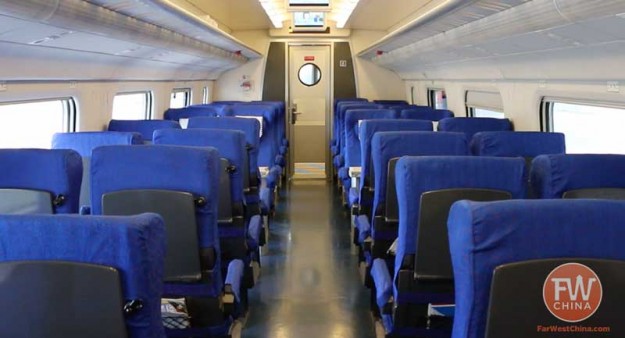
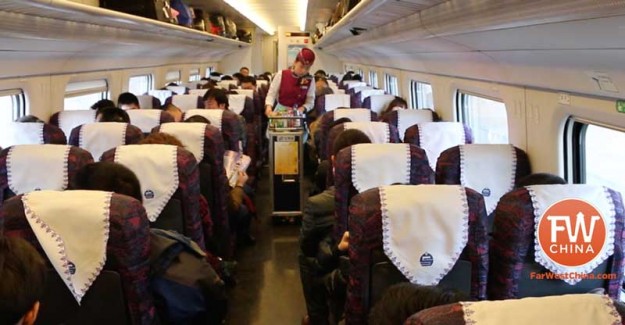
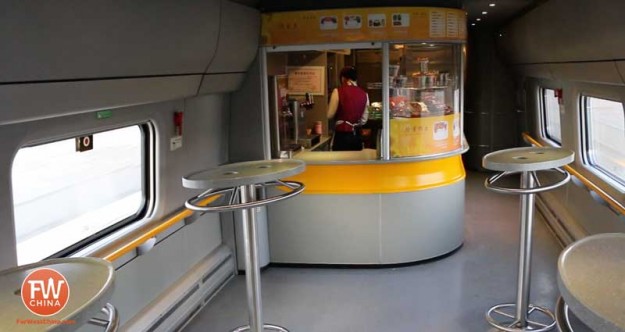
I was hoping that there would be power outlets in first class but alas, they’re only found in the bathroom.
Cell coverage has been terrible the entire trip which means I haven’t been able to make any calls or check email. I’m grateful, however, that leg room is spacious, which says a lot coming from a 6’2″ (1.8m) guy.
If you’re traveling in a group of three or more, there are some seats which face each other that would allow for great conversation and games.
Finally – and this is huge – the first class car has a toilet that meets western standards, meaning it is both clean (for now) and it has an actual seated toilet.
This is different than what you might normally expect with bathrooms in China.
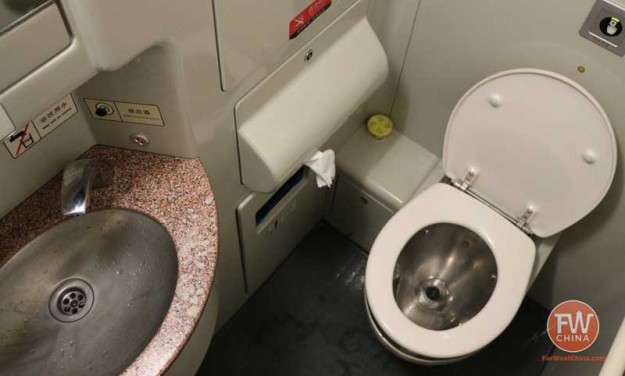
It truly is a comfortable ride, particularly for those of us who have lived here in Xinjiang for a while and aren’t used to these kinds of luxuries.
Riding the Train in China
I can now see NanShan through the south facing windows of the train, which means that I’m reaching the end of my trip back home to Urumqi.
Soon I’ll be jumping into a Urumqi taxi which more than likely won’t be such a peaceful and picturesque ride.
Nor will I be traveling at 200km/hr.
No doubt I’ll be boarding this train again soon, if for no other reason than to give my young son the pleasure of his first ride. I know he’s going to love it.
